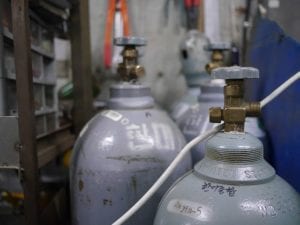Similar to an electrical equivalent, gas installations need to be regulated in order to ensure optimum safety practices are adhered to.
As gas usage increases in South African homes and businesses, awareness needs to be drawn to the safe practice of working with, installing and storing gas. As an electrician would need to be certified, so does a gas installer (gas practitioner). The South African Qualification and Certification Committee for Gas (SAQCC Gas)is mandated by the Department of Labour to ensure all gas practitioner are trained and certified through the four different gas associations. These associations are LPGSASA, SACGA, SARACCA and SAGA. Each association plays a vital role in ensuring compliance with the safety regulations within their specific gas markets/industries. In South Africa there are four main gas industries that are regulated by the Department of Labour, they are: natural gas, liquefied petroleum gas, air conditioning and refrigeration gas, and compressed industrial and medical gases. Essentially, if you work with gas installations you would need to be a registered gas practitioner with the body which is mandated to register all gas practitioners: SAQCC Gas. Business and gas installations Similar to homeowners, business owners would need to request a Certificate of Conformity (CoC) from a registered gas practitioner. In many instances, installers are working without certification, which means they may not know how to operate with the type of gas your business is using.Liability for any harm or safety contravention would then fall on the business owner, not the insurance company. Furthermore, company owners would not be able to apply for any compensation aid or benefit for employees hurt or life loss.
Why regulate gas installations? Gas is a safe product to work with. It is predictable and can be easily transported or transferred from one point to the other. The varieties of uses for gas are endless and what makes gas attractive to many, is its availability. Worldwide, Gas production is in surplus, and many gases are naturally extracted. So then why the requirement for regulation? A large percentage of gas incidents are as a result of human error. The number of uncertified gas installers is growing and many home and business owners are not requesting proof of registration. This is available from all registered practitioners in the form of a license card (similar to our driver’s license) which is issued by the SAQCCGas and carries the installer’s name, photograph, unique SAQCCGas number (QCC#) as well as the type of gas with which the installer is permitted to work. Consumers should always insist on a CoC from the practitioner on completion of the installation. This is the practitioner’s confirmation that the installation is compliant with all relevant regulations and national safety standards. No license and/or no CoC would render the installation illegal and potentially unsafe. Incidents resulting from poor installation can vary from property damage to loss of life and it is essential that all gas consumers request the above. To confirm whether or not a practioner is indeed registered, one can check the information provided on the SAQCCGas website. Electricity is no longer cheap for South Africans. Gas is a viable alternative and has the ability to satisfy South Africa’s hunger for a safe and efficient alternative energy.






